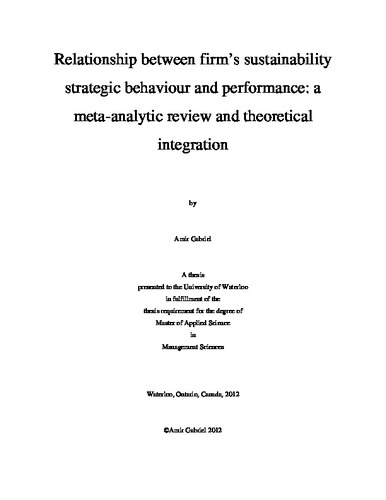| dc.description.abstract | Most theories that attempt to describe the relationship between corporate sustainability strategies and a company’s triple bottom line also make the assumption that there is insufficient evidence to produce generalizable conclusions. This study contributes to the overall body of knowledge, as there is a lack of significant generalizable knowledge on corporate sustainability strategies and a company’s triple bottom line.
To provide a methodologically more rigorous review, we performed a meta-analysis on 18 scholarly articles from top-tier academic journals containing 64 experimental treatments that measured an observed (not self-reported) behavioural outcome, which yielded a sample size of 23,871 observations. Most studies combined multiple treatments, which preclude definitive conclusions on the most effective treatments.
The findings suggest that there is a positive medium to strong relationship between sustainability-oriented strategies, for both reactive and proactive behaviours (Dyllick et al., 1997; Gminder et al., 2002), and a company’s “triple bottom line.” Furthermore, regardless of the firm type (e.g., multinational corporation or local establishment, emerging economy firm or developed nation business), proactive sustainability-oriented strategies tend to have a higher payoff than firms that adopt reactive sustainability-oriented strategies. This meta-analysis establishes a greater degree of certainty with respect to corporate sustainability strategies and a firm’s triple bottom line relationship than currently assumed by many business scholars.
To conclude, the sustainability concept has significantly expanded the scope of measuring organizational performance according to economic, social, and environmental components (Robins, 2006), which are collectively described as the “triple bottom line.” Organizations have determined that specific products and processes can have serious environmental and social implications beyond providing typical economic benefits (Sarkis, 2001). Based on the results of this study, companies should develop more diversified sustainability strategies that will help them to identify and capture value (McMullen, 2001). The results demonstrate that sustainability can provide companies with a strategic advantage, which is vital for the organization’s long-term viability and success (Orlitzky et al., 2003).
This study also examines the balance between reasonable return on investment and long-term organizational viability, which greatly impacts organizational decision-makers that contend with numerous stakeholder issues, pressure from environmental agencies, and increased social consciousness that affects workers, consumers, and communities. It supports the conclusion that being proactive in responding to these conflicting pressures and barriers helps organizations to achieve higher levels of performance. | en |

